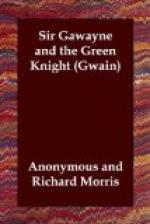652 for-be = for-bi = surpassing, beyond.
681 for Hadet read Halet = haled = exiled (?). See line 1049.
806 auinant = auenaunt, pleasantly. Sir F. Madden reads amnant.
954 of. Should we not read on (?).
957 Þat oþer wyth a gorger wat3 gered ouer þe
swyre.
The gorger or
wimple is stated first to have appeared in Edward the
First’s
reign, and an example is found on the monument of Aveline,
Countess of Lancaster,
who died in 1269. From the poem, however, it
would seem that
the gorger was confined to elderly ladies (Sir F.
Madden).
968 More lykker-wys on to lyk,
Wat3
þat scho had on lode.
A more pleasant
one to like,
Was
that (one) she had under her control.
988 tayt = lively, and hence pleasant, agreeable.
1015 in vayres, in purity.
1020 dut = dunt (?) = dint (?), referring to sword-sports.
1022 sayn[t] Ione3 day. This is the 27th of
December, and the last of the
feast. Sometimes
the Christmas festivities were prolonged to New
Year’s Day
(Sir F. Madden).
1047 derne dede = secret deed. I would prefer
to read derue dede =
great deed.
Cf. lines 558, 564.
1053 I wot in worlde, etc. = I not (I know not) in worlde, etc.
1054 I nolde, bot if I hit negh my3t on nw3eres
morne,
For
alle þe londe in-wyth Logres, etc.
I would not [delay
to set out], unless I might approach it on New
Year’s morn,
for all the lands within England, etc.
1074 in spenne = in space = in the interval = meanwhile. See line 1503.
1160 slentyng of arwes. Sir F. Madden reads
sleutyng.
“Of
drawyn swordis sclentyng to and fra,
The
brycht mettale, and othir armouris seir,
Quharon
the sonnys blenkis betis cleir,
Glitteris
and schane, and vnder bemys brycht,
Castis
ane new twynklyng or a lemand lycht.”
(G.
Douglas’ AEneid, Vol. i, p. 421.)
1281 let lyk = appeared pleased.
1283 Þa3 I were burde bry3test, þe burde in mynde
hade, etc.
The sense requires
us to read:
Þa3
ho were burde bry3test, þe burne in mynde hade, etc.
i.e., Though
she were lady fairest, the knight in mind had, etc.
1440 Long sythen [seuered] for þe sounder þat wi3t
for-olde
Long since separated
from the sounder or herd that fierce (one)
for-aged (grew
very old).
“Now
to speke of the boore, the fyrste year he is
A
pygge of the sounder callyd, as haue I blys;
The
secounde yere an hogge, and soo shall he be,
And
an hoggestere, whan he is of yeres thre;
And
when he is foure yere, a boor shall he be,
From
the sounder of the swyne thenne departyth he;
A
synguler is he soo, for alone he woll go.”
(Book
of St. Alban’s, ed. 1496, sig. d., i.)




